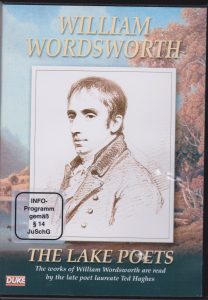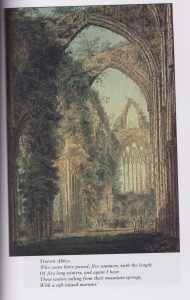another signature poem by William Wordsworth.

Up! up! my Friend, and quit your books;
Or surely you’ll grow double:
Up! up! my Friend, and clear your looks;
Why all this toil and trouble?
The sun above the mountain’s head,
A freshening lustre mellow
Through all the long green fields has spread,
His first sweet evening yellow.
Books! ’tis a dull and endless strife:
Come, hear the woodland linnet,
How sweet his music! on my life,
There’s more of wisdom in it.
And hark! how blithe the throstle sings!
He, too, is no mean preacher:
Come forth into the light of things,
Let Nature be your teacher.
She has a world of ready wealth,
Our minds and hearts to bless—
Spontaneous wisdom breathed by health,
Truth breathed by cheerfulness.
One impulse from a vernal wood
May teach you more of man,
Of moral evil and of good,
Than all the sages can.
Sweet is the lore which Nature brings;
Our meddling intellect
Mis-shapes the beauteous forms of things:—
We murder to dissect.
Enough of Science and of Art;
Close up those barren leaves;
Come forth, and bring with you a heart
That watches and receives.
………………………
There are moments and days when one realizes that there is much that is of value and healthfulness in Nature–the restorative and healing spiritual powers that the English Romantic poets imagined and experienced in/within Nature. Wordsworth’s best poems exemplify the essence of this wisdom.
Nature is a great companion and teacher and book learning/scholarly pursuits, like everything else, have their limits. We can ‘reason ourselves out of life’ and thinking can get in the way of an honest, open response to the natural world around us, alienating us–something Wordsworth wrote concisely about in “The World Is Too Much with Us”.
Excess of ego/analysis can destroy whatever we come into contact with: “Mis-shapes the beauteous forms of things”. There are limits, too, to what the worlds of Science and the Arts can offer to us. Perhaps these are too rational, too ‘second-hand’ to what Nature offers in abundance and without limits.
Far more important is having an open heart to receive what Nature and the greater world offers far from the “barren leaves” of book learning and academic pursuits. For anyone too serious and overly-engaged with human agendas and conflicts, Wordsworth’s poem is a brilliant tonic, an invitation to live life more wholly.

